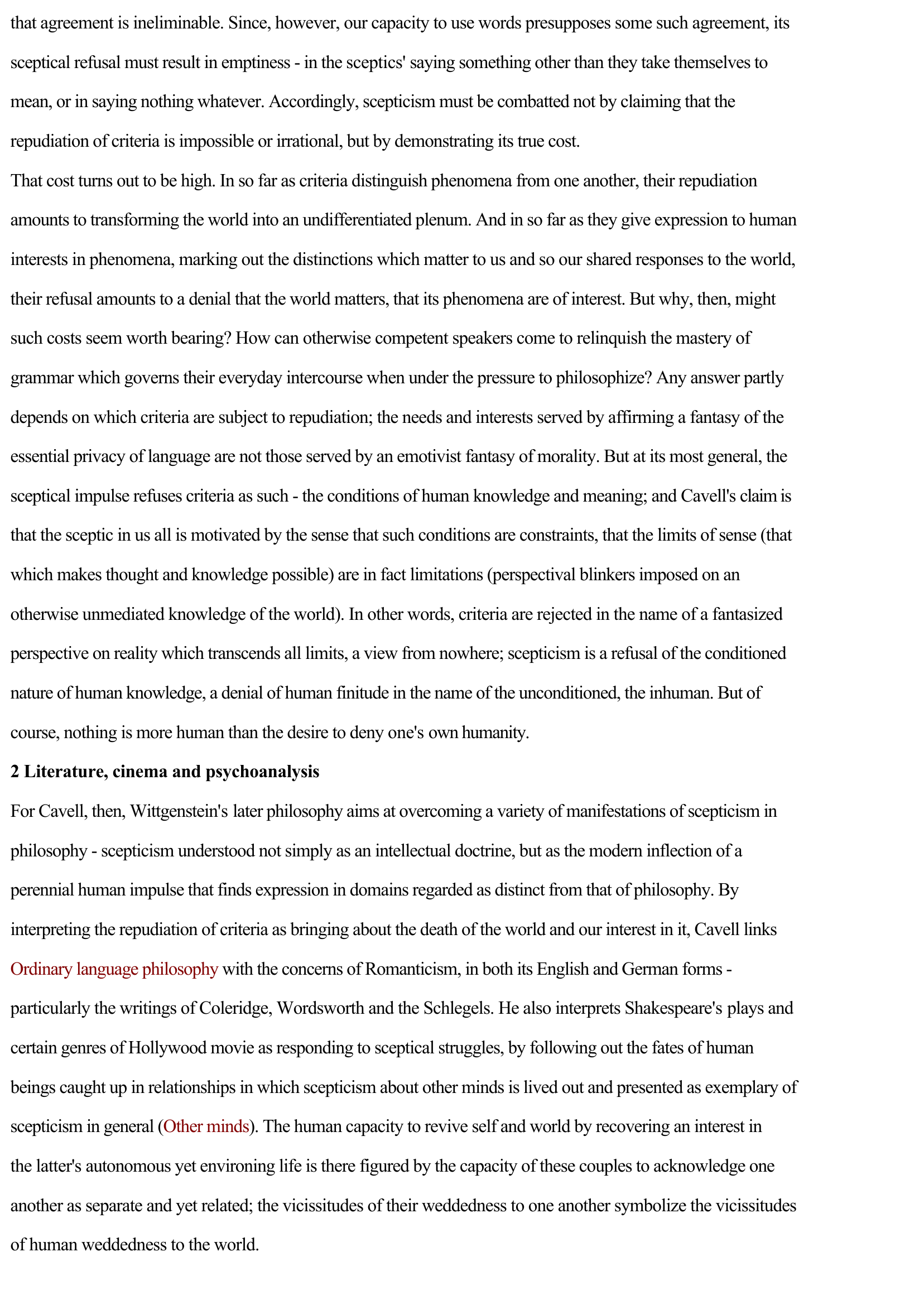Cavell, Stanley
Publié le 22/02/2012
Extrait du document
«
that agreement is ineliminable.
Since, however, our capacity to use words presupposes some such agreement, its
sceptical refusal must result in emptiness - in the sceptics' saying something other than they take themselves to
mean, or in saying nothing whatever.
Accordingly, scepticism must be combatted not by claiming that the
repudiation of criteria is impossible or irrational, but by demonstrating its true cost.
That cost turns out to be high.
In so far as criteria distinguish phenomena from one another, their repudiation
amounts to transforming the world into an undifferentiated plenum.
And in so far as they give expression to human
interests in phenomena, marking out the distinctions which matter to us and so our shared responses to the world,
their refusal amounts to a denial that the world matters, that its phenomena are of interest.
But why, then, might
such costs seem worth bearing? How can otherwise competent speakers come to relinquish the mastery of
grammar which governs their everyday intercourse when under the pressure to philosophize? Any answer partly
depends on which criteria are subject to repudiation; the needs and interests served by affirming a fantasy of the
essential privacy of language are not those served by an emotivist fantasy of morality.
But at its most general, the
sceptical impulse refuses criteria as such - the conditions of human knowledge and meaning; and Cavell's claim is
that the sceptic in us all is motivated by the sense that such conditions are constraints, that the limits of sense (that
which makes thought and knowledge possible) are in fact limitations (perspectival blinkers imposed on an
otherwise unmediated knowledge of the world).
In other words, criteria are rejected in the name of a fantasized
perspective on reality which transcends all limits, a view from nowhere; scepticism is a refusal of the conditioned
nature of human knowledge, a denial of human finitude in the name of the unconditioned, the inhuman.
But of
course, nothing is more human than the desire to deny one's own humanity.
2 Literature, cinema and psychoanalysis
For Cavell, then, Wittgenstein 's later philosophy aims at overcoming a variety of manifestations of scepticism in
philosophy - scepticism understood not simply as an intellectual doctrine, but as the modern inflection of a
perennial human impulse that finds expression in domains regarded as distinct from that of philosophy.
By
interpreting the repudiation of criteria as bringing about the death of the world and our interest in it, Cavell links
Ordinary language philosophy with the concerns of Romanticism, in both its English and German forms -
particularly the writings of Coleridge, Wordsworth and the Schlegels.
He also interprets Shakespeare 's plays and
certain genres of Hollywood movie as responding to sceptical struggles, by following out the fates of human
beings caught up in relationships in which scepticism about other minds is lived out and presented as exemplary of
scepticism in general ( Other minds ).
The human capacity to revive self and world by recovering an interest in
the latter's autonomous yet environing life is there figured by the capacity of these couples to acknowledge one
another as separate and yet related; the vicissitudes of their weddedness to one another symbolize the vicissitudes
of human weddedness to the world..
»
↓↓↓ APERÇU DU DOCUMENT ↓↓↓
Liens utiles
- Cavell, Stanley - philosophie.
- Milgram, Stanley - psychologie & psychanalyse.
- Hall, Stanley - psychologie & psychanalyse.
- COMMENT J’AI TROUVÉ LIVINGSTONE. (résumé & analyse) Henry Morton Stanley
- DANS LES TÉNÈBRES DE L’AFRIQUE (résumé & analyse) Henry Morton Stanley

































